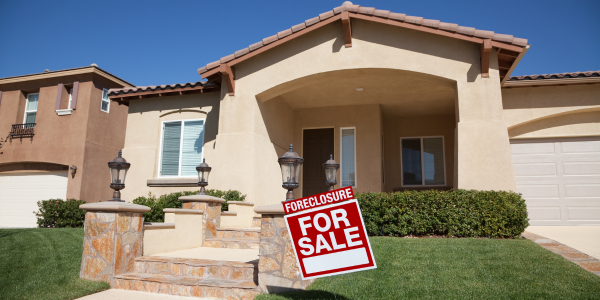Foreclosed properties can be a gold mine for savvy investors and homebuyers. They often come at a lower price, making them an attractive option.
However, buying these distressed homes is not without its challenges. It requires a keen understanding of the process and potential pitfalls.
In this guide, we delve into the world of foreclosure investing. We aim to equip you with the knowledge you need to navigate this complex terrain.
We’ll explore the different stages of foreclosure, how to find and assess these properties, and the buying process. We’ll also discuss the risks involved and how to mitigate them.
Whether you’re a seasoned investor or a first-time homebuyer, this guide will provide valuable insights. It will help you make informed decisions when buying foreclosed properties.
Understanding Foreclosed Properties
Foreclosed properties are homes that have been seized by lenders. This happens when homeowners default on their mortgage payments.
The foreclosure process varies by state. It’s crucial to understand the laws in your area.
These properties can be a great investment. They often sell for less than their market value.
However, they also come with risks. It’s important to do thorough research before buying.
The Foreclosure Process
Foreclosure begins when a homeowner fails to make mortgage payments. The lender then initiates legal proceedings to reclaim the property.
The process can take several months to years. It depends on the state laws and the lender’s policies.
During this time, the homeowner may try to sell the property. This is known as a short sale.
If the property doesn’t sell, it goes to a foreclosure auction. If it still doesn’t sell, it becomes a real estate owned (REO) property.
Types of Foreclosed Homes
Foreclosed homes come in three types. Each type represents a different stage in the foreclosure process.
Pre-Foreclosure
Pre-foreclosure is the first stage. It begins when the homeowner receives a default notice from the lender.
During this stage, the homeowner can still sell the property. This can help them avoid foreclosure.
Auction
If the property doesn’t sell in pre-foreclosure, it goes to auction. Here, the highest bidder wins the property.
Auctions can be competitive. It’s important to be prepared and have your financing in place.
Real Estate Owned (REO)
If the property doesn’t sell at auction, it becomes an REO property. The lender now owns it and will try to sell it through a real estate agent.
REO properties can be a good deal. They often sell for less than their market value.
Pros and Cons of Buying Foreclosed Properties
Buying foreclosed properties can be a lucrative investment. They often sell for less than their market value. This can result in significant savings.
However, these properties can also come with risks. They may have hidden damages or legal issues. It’s crucial to do a thorough inspection and title search.
Additionally, the buying process can be complex. It often involves navigating legal proceedings and bidding at auctions.
Despite these challenges, many investors find foreclosure investing rewarding. With proper research and due diligence, it can be a profitable venture.
Remember, every investment comes with risks. It’s important to weigh the pros and cons before diving in.
How to Find Foreclosed Properties
Finding foreclosed properties requires some legwork. They are often listed by banks, real estate agents, and online platforms.
Public records can also be a valuable resource. They can help identify distressed homes before they hit the market.
Here are some places to look for foreclosed properties:
- Banks and credit unions
- Real estate agents specializing in foreclosures
- Online foreclosure listing services
- County clerk or public records office
Remember, patience and persistence are key. The right property may take time to find.
Assessing the Value and Costs
Before buying a foreclosed property, it’s crucial to assess its value and potential costs. This includes the purchase price, renovation costs, and the property’s market value.
A thorough inspection is a must. It helps identify potential issues that could impact the property’s value.
Also, consider the cost of any necessary renovations. These can significantly affect your budget and the property’s overall value.
Property Inspections
A property inspection is a critical step when buying foreclosed properties. It helps identify potential issues with the property.
These issues could include structural damage, outdated systems, or hidden problems like mold or pests. Be prepared for the possibility of extensive repairs.
Remember, foreclosed properties are often sold “as-is”. This means the seller won’t make any repairs before the sale.
Estimating Renovation Costs
Renovation costs can significantly impact the overall cost of a foreclosed property. It’s important to estimate these costs before making a purchase.
Consider hiring a contractor to provide an estimate. This can help you budget for the necessary repairs and renovations.
Keep in mind, unexpected expenses often arise during renovations. It’s wise to have a contingency plan for these costs.
Understanding Market Value
Understanding the market value of homes in the area is crucial. It helps determine if a foreclosed property is a good investment.
Research recent sales of similar properties in the area. This can give you an idea of what your property could be worth after renovations.
Remember, the real estate market can fluctuate. Stay informed about local market trends to make the best investment decisions.
Financing Foreclosed Homes
Financing is a key aspect to consider when buying foreclosed properties. The method of financing can greatly impact the buying process.
Some buyers opt for cash purchases. Others may choose to finance the property through a loan.
Each option has its own benefits and drawbacks. It’s important to understand these before making a decision.
Cash Purchases
Purchasing a foreclosed property with cash can have its advantages. It can lead to quicker closings and potentially lower purchase prices.
However, it requires a significant amount of upfront capital. This may not be feasible for all buyers.
Loan Options
If you’re considering a loan, there are several options available. These include conventional loans, FHA loans, and special foreclosure loans.
Each loan type has its own requirements and benefits. It’s crucial to research each option to find the best fit for your situation.
The Buying Process
The process of buying foreclosed properties can be complex. It often involves several stages and requires careful planning.
The first step is to identify potential properties. This can be done through various channels such as banks, real estate agents, or online platforms.
Once a property is identified, it’s important to conduct a thorough inspection. This helps to assess the property’s condition and potential renovation costs.
The final step is the purchase. This can happen through a public auction or directly from the bank, depending on the foreclosure stage.
Bidding at Auctions
Bidding at auctions can be a competitive process. It requires preparation and a clear understanding of the property’s value.
It’s important to set a maximum bid before the auction. This helps to avoid overspending due to the competitive nature of the auction.
Remember, winning the bid often means paying the full amount immediately. Be prepared for this financial commitment.
Negotiating with Banks for REO Properties
When a property becomes Real Estate Owned (REO), it’s owned by the bank. This stage offers the opportunity to negotiate the price.
Banks are often eager to sell these properties to recover their losses. This can lead to lower purchase prices.
However, it’s crucial to conduct due diligence. Ensure the property is free from liens and the title is clear before finalizing the purchase.
Risks and How to Mitigate Them
Investing in foreclosed properties comes with risks. It’s crucial to be aware of these and know how to mitigate them.
One common risk is the potential for legal issues. These can arise from outstanding liens or disputes over the property title.
Another risk is the possibility of unexpected repairs. Foreclosed homes are often sold “as-is,” meaning they may require extensive renovations.
Despite these risks, careful planning and due diligence can help mitigate them. This can lead to a successful investment in foreclosed properties.
Legal Issues and Liens
Legal issues can complicate the buying process. It’s important to conduct a thorough title search to identify any potential issues.
Outstanding liens can increase the cost of the property. These are debts that must be paid off before the property can be sold.
To avoid these issues, consider hiring a real estate attorney. They can help navigate the legal complexities of buying foreclosed properties.
Unexpected Repairs
Foreclosed homes often require repairs. These can range from minor cosmetic updates to major structural work.
It’s crucial to conduct a thorough property inspection. This can help identify potential issues and estimate repair costs.
Remember, the cost of repairs should be factored into your overall budget. This will help ensure a profitable investment.
Conclusion: Is Foreclosure Investing Right for You?
Foreclosure investing can be a profitable venture. However, it requires careful planning, thorough research, and a willingness to take on risks.
If you’re prepared to navigate the complexities, it can offer great rewards. These include potential below-market purchase prices and high returns on investment.
In the end, the decision to invest in foreclosed properties depends on your financial goals, risk tolerance, and investment strategy.



